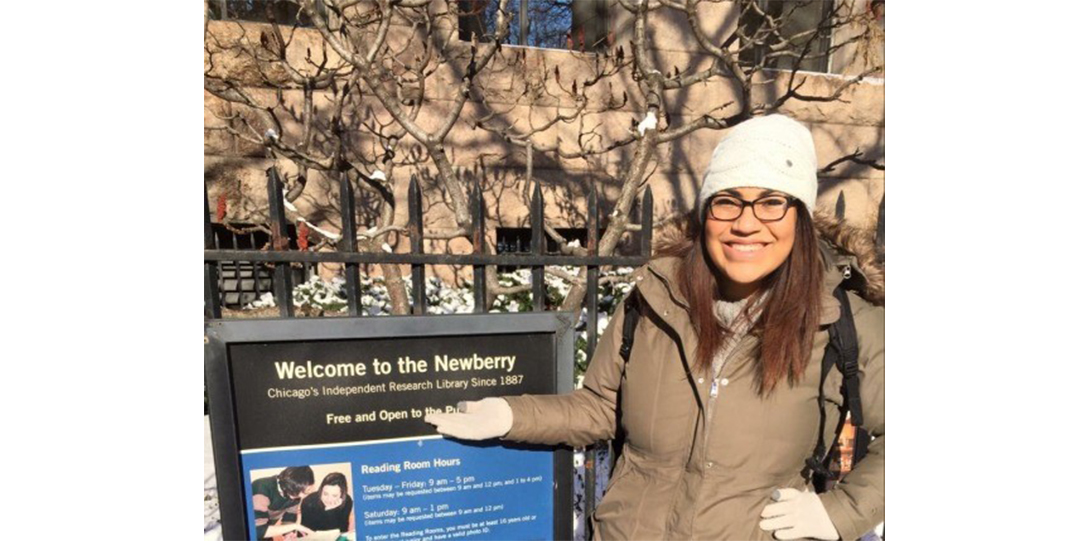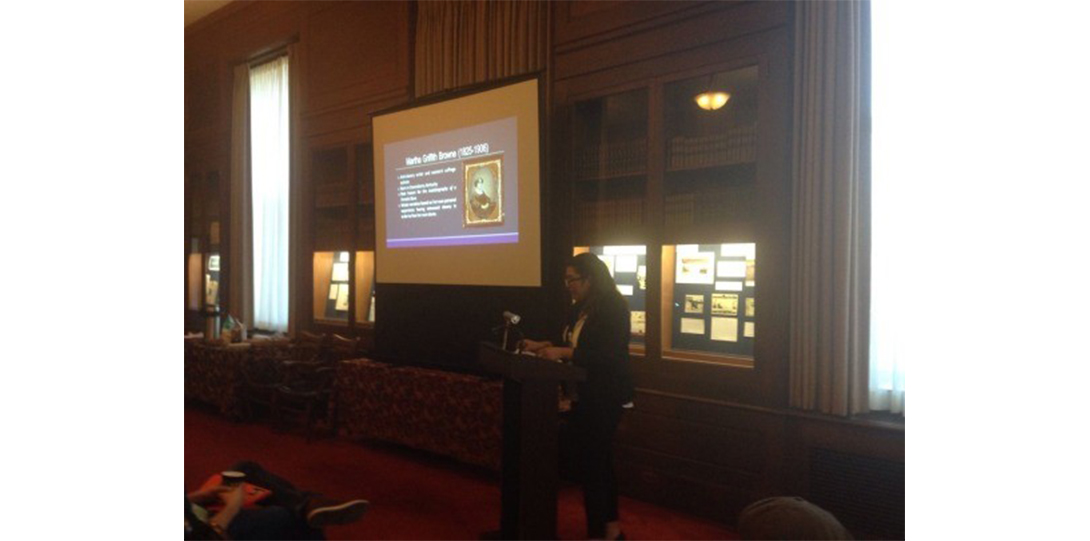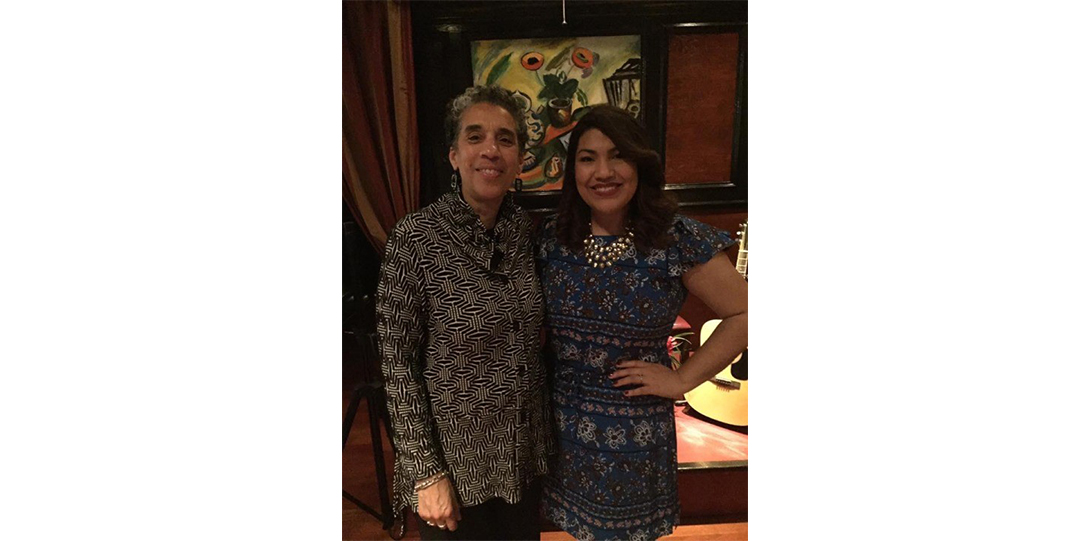Student Spotlight: Zorgie Sanchez
Zorgie Sanchez was a Masters student in English, who worked as a teaching assistant AAST 100 ((Introduction to African American Studies) with Natasha Barnes. Before starting the graduate program, she majored in English and minored in African American Studies as an undergraduate.
Interview with Zorgie Sanchez Heading link
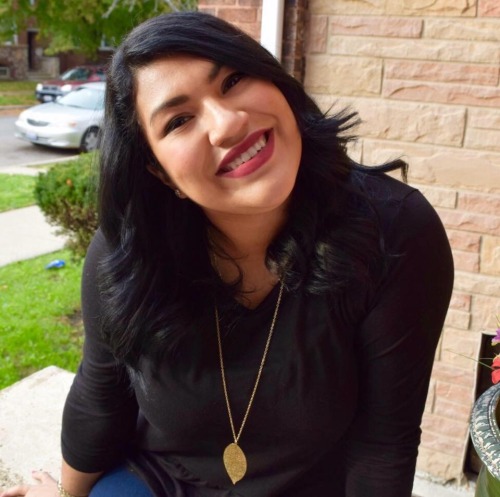
Why did you decide to study African American studies?
Zorgie Sanchez: I got into [that] after I took an African American literature course. It was kind of on the idea that history is fabricated. I never really got that until I took that course.
Who taught that?
Sanchez: Madhu Dubey. I’ve taken three classes with her, and she’s kind of my mentor. I had her for my pro-seminar as well.
So for your graduate studies, what are you deciding to focus on?
Sanchez: Right now I’m doing neo-slave narratives. I’m making the argument that they’re based in historical facts more so than actual slave narratives.
What led you to this focus?
Sanchez: We focused on this in my upper level African American literature course, and we talked about how often there were not historical facts on what happened. Even when I took the Newberry undergraduate seminar, my research project involved slave narratives that were written in the 1800s. The one that I particularly focused on was actually about a white woman claiming to be an African American female slave. A lot of it was fictionalized, but it was purported to be historical. I think there are a lot of discrepancies in the various narratives that we claim as canonical within the genre.
Part Two of Interview Heading link
Do you think there is any benefit to those narratives?
Sanchez: They do help you see how problematic it is that we value them so highly when we teach history, and the differences we should discuss.
So obviously this would make someone think of cases like Rachel Dolezal. There are small but growing bodies of people who believe in choosing your racial category. What are your thoughts?
Sanchez: I think now it’s more out of convenience or to be “cool”. When people tried to pass for a different race back then it was for the means of survival. What she did was a major appropriation. Yes she was made fun of or made into a meme but she is able to go on with her life.
When is something cultural appropriation versus the effects of living in an increasingly globalized world?
Sanchez: I think cultural appropriation means not understanding where the thing in question came from. It’s kind of seeing it as something to be trendy when the dominant culture deems it popular. The woman who wrote that slave narrative was an abolitionist, but it was to make her more socially relevant. That was the case for a lot of abolitionists. They simply supported the abolition of slavery, but not the idea of these people being thought of as human. When we don’t value the culture that it came from or understand its roots that would be appropriation.
What is your cultural background?
Sanchez: I am Venezuelan and Colombian.
What is your connection to African American studies?
Sanchez: We never really discuss the idea of color in my family, but this is the case for a lot of Latino families. I’m not sure if I do have African traces, but I am interested in those cultural aspects: the idea of colorism and of racism.
I don’t really know anything about my background either.
Sanchez: I know for sure I was born in Venezuela, and my dad was born in Colombia. But most of my family identifies with Venezuela because my dad moved there when he was young. My parents moved to the United States about 35 years ago, and I was born in Venezuela on accident though.
So you didn’t grow up there?
Sanchez: I stayed there for about 6 months, but we go back every 3-4 years. Lately we haven’t been able to go back because of the political turmoil over there.
Part Three of Interview Heading link

How do you feel about going back to Venezuela?
Sanchez: I want to go back. I feel like a part of me is always over there. It’s disheartening. Even if we apply for a visa or citizenship we are immediately denied it because we are U.S. citizens. They give the impression that they don’t want Americans on their soil anymore. They have us waiting 6 months to tell us if can submit an application. We are trying hard. We’ve been trying for a year and a half. On top of that the United States has deemed it dangerous to travel over there. If anything happened to us over there, it would be difficult to get any help from either side. So that all definitely plays into the decision of going over there.
So what kind of conversations do you have with your parents about this?
Sanchez: In particular my mom it’s her attempting to process what’s happened because she did spend most of her life there. My grandmother passed away three years ago and we still haven’t been able to go over to see her grave stone. So it’s been an everyday thing for my mother to wonder when she’s going to be able to see her, because she was not given a proper burial. My father does not discuss it much, he seems disheartened, so perhaps that’s why. But I know he doesn’t have quite the same roots or memories my mom does.
What does he think of your academic endeavors?
Sanchez: Originally I was a bio major when I came into UIC. My dad’s plan had always been for me to be a doctor or a surgeon, and when I started getting into writing in high school he thought cool I could start writing essays on medicine. Or I could be published in medical journals. I am not good in science and math, let’s make that perfectly clear. I was failing my first science and math classes, so I switched over to English. My dad didn’t understand why I quit my medical path, and he saw it as a failure on my part for not wanting to continue on. But my mom has always been supportive because she knew I loved writing and reading. But the African American studies aspect of my academic career really did surprise them I guess. It’s mostly been me teaching them things they didn’t know about African American history and how it connects to U.S. history. So I think that’s another aspect that interested me. This is the case with a lot of cultures in the U.S.
So they’ve come around to it?
Sanchez: Yes, definitely. When I was in my seminar, my mom would come with me to the Newberry to look at old artifacts that I was looking at for my project. They thought it was pretty cool.
Part Four of Interview Heading link
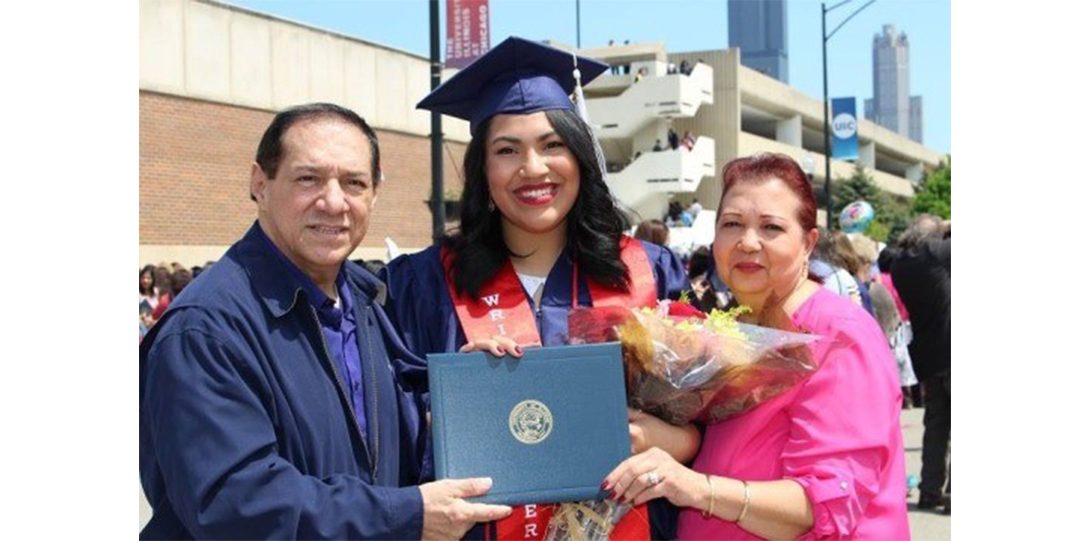
So how has it been as a teaching assistant?
Sanchez: It’s been interesting. I’ve never been trained to be a teacher. I had been a writing tutor for the past three years, but this was definitely a new perspective on teaching. I wanted to know if I could be a professor and thought this is a chance to see if this is for me.
That’s definitely the case for most TAs. Most are just thrown into it.
Sanchez: It’s interesting taking the class again as a TA and seeing a different perspective of what’s going on.
Yeah, have you found a new empathy for students and teachers alike?
Sanchez: Oh yeah. It’s been teaching me a lot. It’s been a great experience.
Do you want to pursue teaching, research or a combination of both?
Sanchez: A combination of both.
Do you want to eventually pursue a PHD?
Sanchez: Yes. An absolute plan.
Do you want to stay here or go elsewhere?
Sanchez: I want to stay in Chicago because my family is here, but if I can’t I might move.
Have you ever lived anywhere else?
Sanchez: I’ve lived in Chicago my entire life.
My experience was completely the opposite, so that’s interesting.
Sanchez: Yeah, you also have to consider cultural values. For example, my parents are very old-fashioned so it would be a big decision that would without a doubt involve them as well. I’m getting married this summer. Me and my fiancée both are at UIC. He’s in the engineering department and is graduating next year. We’ve talked about moving because he has a more flexible job. So he’s just told me “if you want to move let’s do it.”
Well, I think you should.
Sanchez: [laughs] Yeah, I’ve heard that a lot.
But as far as Chicago/ Illinois goes, there are a lot of good PHD programs.
Sanchez: I have been looking already. It’s going fast.
If you have a set plan it’ll probably go smoothly.
Sanchez: Well my original plan was to do an MA elsewhere, but I didn’t get any funding. Not as much that I did here.
For your research plans for the PHD do you want to continue down the same path or pursue something new?
Sanchez: I have so many different threads I’m working on. Another one is the theme of motherhood and magical realism.
I love that.
Sanchez: Yeah, and then neo-slave narratives. Those are the two that I’m always seeing in the classes I take or the work I do.
Tell me more about motherhood and magical realism.
Sanchez: I’m actually working on a paper on that right now. I think a lot of the time with first generation children we see mothers portrayed in books as these old-world women who are made fun of or are kind of childlike and their children look at them with embarrassment. But a lot of times the magical realism and fantastical aspects comes from the mothers, like Tropic of Orange where the Mother is a magical entity. Women who are actually strong and fearless, but who are portrayed as the complete opposite under the lens of the dominant culture. These are women who made it possible for their children to be able to receive the opportunities they never had, who have fought against all odds to get her, only to be alienated by not only the land of opportunity, but by their own children. And it’s a little too late when the children realize that the magic, and in turn their mothers, weren’t the enemy nor the the things to be ashamed about.
Part Five of Interview Heading link
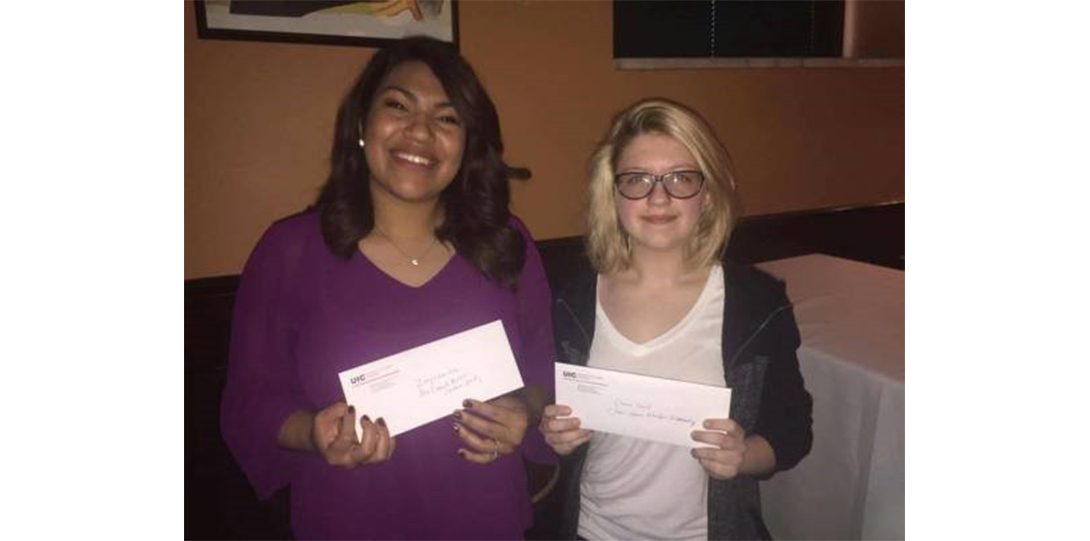
Are you trying to do an analysis of literary work?
Sanchez: Yes, I do a lot of literary analysis.
Do you eventually want to teach in both African American Studies and English?
Sanchez: I do like the idea of working with first-year English students. I like teaching how to read, how to analyze, how to write a paper. I like the idea of teaching all over.
Part Six of Interview Heading link
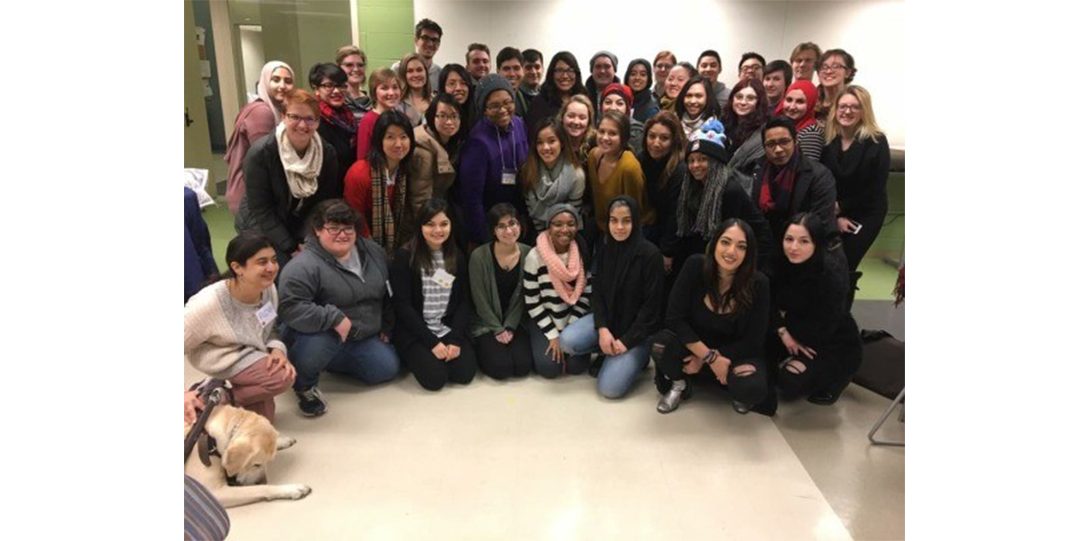
So how can we combat the disinterest in writing that we see?
Sanchez: I always try to take it a step back. With this paper they’re being assigned, I might take 20 minutes to ask what their experience in writings papers. Give them a template of what a thesis looks like. Or even take a broad idea and make it more in-depth. I think we just need to take out even more class time to teach them the basics. A lot of time, the students are in majors that don’t require writing. It is tough because there is a certain rubric to follow and only so much time to go over certain things in the classroom.
Do you think the problem with writing starts much earlier?
Sanchez: I think it has a lot to do with the school you went to. For a lot of students they don’t know what is expected in college. When I came into college, I got a D on my first English paper. It was the first time I had gotten a D. And I thought, ‘what am I doing wrong?’ So I went to the professor and asked. But a lot of students don’t want to ask. They’re embarrassed to ask. It’s hard, but it’s understandable. A lot of us are expected to be perfect, especially in something as “simple” as writing. When we can’t reach that standard it becomes difficult to admit it, much less ask for help.
